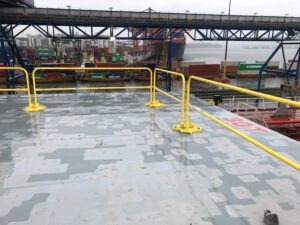Feeder Hole loading
 As expected, the ILWU is not making the process easy to resume the practice of loading grain through feeder holes in the Port of Vancouver. There was a meeting held on January 15 with the stevedore companies and the ILWU that unfortunately did not end well. Despite having an engineer present to address the Union’s concerns about combustion due to static, the Union still seems to be hesitant to dismiss their concerns and work towards a solution.
As expected, the ILWU is not making the process easy to resume the practice of loading grain through feeder holes in the Port of Vancouver. There was a meeting held on January 15 with the stevedore companies and the ILWU that unfortunately did not end well. Despite having an engineer present to address the Union’s concerns about combustion due to static, the Union still seems to be hesitant to dismiss their concerns and work towards a solution.
The following is a summary provided by a local stevedoring company –
Quote
The purpose of the meeting on January 15, 2019 was to address the unions concerns and provide solutions to the bonding and grounding of the equipment along with the static build up if any on the hopper. Evan Sherman (Morrow Engineering) went through his report and recommendations to address both areas of concern. He recommended isolation instead of grounding/bonding which means putting up a barrier around the hopper during loading and attach a cable from the pipe to the hopper to address the static issue. Evan stated that the static buildup on the hopper is minimal and any static would be dissipated in wet weather. The union was satisfied with the cable recommendation to address their static concerns. However, the union was still not satisfied that grounding the hopper was not necessary. The union believes there’s a potential electrical hazard if a motor in gallery malfunctions (Example a splice in the electrical cable creating an arc in the system). The engineer explained that if a motor faults, the neutral grounding/circuit breakers at the terminal serves as engineering controls to prevent a worker from being shocked. The union was still not satisfied and continue to make ridiculous suggestions on ways to ground the vessel. The union commented at one point that the loading spout and the elbow which is attached to the pipe is a potential hazard which is ridiculous. The meeting ended abruptly. It was quite evident during the meeting that the union has no intentions to load during inclement weather.
Unquote
A further meeting was conducted on the morning of January 24 which has since reinforced the strategy going forward (see below). Additionally, a ‘safety expert’ is to be called in to conduct a risk analysis. Once the analysis has been completed a report is then to be sent to all parties detailing the potential hazards of the procedures.
- Revise our Universal HPP and SOP to incorporate the bonding/grounding and static issue and the potential electrical hazards as per the engineer’s report.
- Have a meeting with our respective safety committees to present the revised SOP.
- Issue a letter to the union with our intentions to begin loading through feeder during inclement weather with the revised SOP and all relevant hazards have been addressed.
- If the union refuses to work as directed on the first trial run, we will call the regulator (Port Warden to rule on the work stoppage)
- If the Port Warden rules in our favor and the union continues the work stoppage, we would at this point to involve an arbitrator to address the refuse to work.
Additionally, for those parties with a vested interest in the grain industry – it is important to note the following excerpt from the Canadian Labour Code, Part I of Industrial Relations –
QUOTE
During a strike or lockout not prohibited by this Part, an employer in the long-shoring industry, or other industry included in paragraph (a) of the definition federal work, undertaking or business in section 2, its employees and their bargaining agent shall continue to provide the services they normally provide to ensure the tie-up, let-go and loading of grain vessels at licensed terminal and transfer elevators, and the movement of the grain vessels in and out of a port.
UNQUOTE
For more information on this obligation to service grain vessels, please click here.



